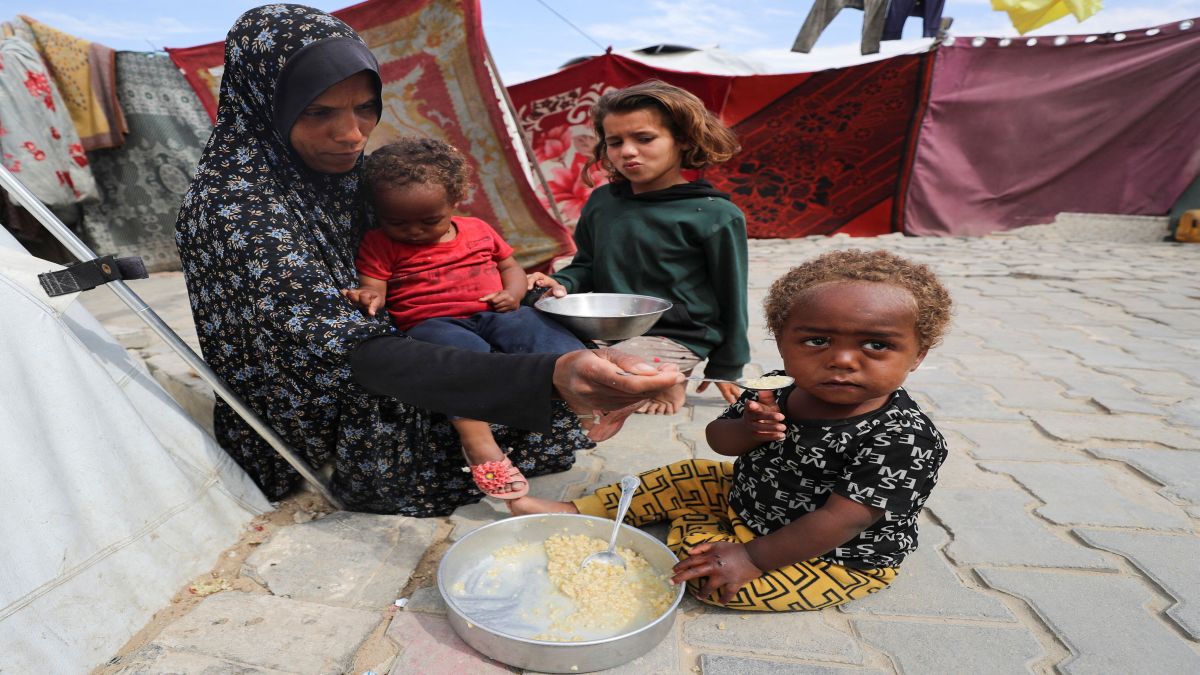The clock is ticking down — towards the annihilation of babies in Gaza. If Israel doesn’t allow for aid to enter the besieged enclave, a whopping 14,000 babies could die within the next 48 hours, according to United Nations humanitarian chief Tom Fletcher.
The horrific picture painted by Fletcher comes as Israel has blocked all food, medicine and other life-saving aid from entering the area since March 2. As of Monday (May 19), a trickle of aid was authorised to enter for the first time since then but was not immediately distributed.
But what’s going on? Why is the situation so dire? We take a closer look.
‘14,000 babies in Gaza could die in next 48 hours’
In an interview with the BBC on Tuesday, UN humanitarian chief Tom Fletcher warned that as many as 14,000 babies could die in Gaza within 48 hours if more aid does not enter the war-torn enclave.
“There are 14,000 babies that will die in the next 48 hours unless we can reach them… We run all sorts of risks trying to get that baby food through to those mothers who cannot feed their children right now because they’re malnourished,” he said, speaking to BBC’s Radio 4.
When asked how the UN worked out that 14,000 babies were at a risk of starvation in Gaza, Fletcher said teams of the United Nations are working in places such as medical centres and schools to assess need. “We have strong teams on the ground — and of course many of them have been killed… we he still have lots of people on the ground — they’re at the medical centres, they’re at the schools…trying to assess needs,” he said.
Fletcher’s comments are significant; they came after Israel allowed the entry of just five aid trucks into Gaza on Monday — a “drop in the ocean” of what Palestinians need. “Let’s be clear, those five trucks are just sat on the other side of the border right now, they’ve not reached the communities they need to reach,” Fletcher said.
Following the UN official’s remarks, Yair Golan, a left-wing opposition voice and the former deputy chief of staff of the Israeli army criticised the Israeli government led by Prime Minister Benjamin Netanyahu saying the Jewish nation risked becoming “a pariah state” over the war in Gaza.
“A sane country does not wage war against civilians, does not kill babies as a pastime, and does not engage in mass population displacement,” said Golan in a charged interview with local radio station Reshet Bet.
He further added, “The Jewish people, who have endured persecution, pogroms, and genocides throughout our history … are the ones now taking actions that are utterly unconscionable.”
But how did Gaza get here and how bad is the situation?
Since the start of the Israel-Hamas war following the October 7, 2023 attacks, the Netanyahu-led government has been restricting the flow of humanitarian aid into the enclave. According to UN officials, the Gaza Strip requires 500 truckloads of aid on a daily basis to meet the population’s requirement.
However, as of March 2, Israel has blocked all aid — including food and medicine — from entering Gaza.
This exacerbates the existing famine-like conditions in the Gaza Strip. A UN-backed Integrated Food Security Phase Classification (IPC) assessment says more than 93 per cent of children in Gaza, or about 930,000, are at risk of famine.
Many Palestinians say that the starvation is even worse than Israel’s bombardments, having been starved by varying levels of Israel’s blockade for 19 months and with food costs constantly on the rise. The total aid blockade ushered in the worst conditions of the genocide so far; one Palestinian reporter said in March that children in the region are so hungry that they’re drawing pictures of food in the sand.
Earlier, the World Food Programme estimated there are 14,000 children in Gaza with severe acute malnutrition.
The UNRWA Director of Health Akihiro Seita added on Tuesday that the situation is getting “exponentially” worse and may soon arrive at a point that is “beyond our control”.
How has Israel responded?
Following international pressure, on Monday (May 19), Israel announced it will allow a “basic amount of food” to enter Gaza to ensure that “no starvation crisis develops”.
In fact, on the same day aid was partially restored, the UK, France, and Canada issued a joint statement condemning Israel’s restrictions on humanitarian access as “wholly inadequate”. The statement called for an end to the military campaign and warned of “further concrete actions” if Israel did not comply.
A day later, the Jewish nation told the UN that it would allow the entry of 100 trucks carrying humanitarian aid.
However, ground realities vary. UN spokesperson Stephane Dujarric said no humanitarian aid has been distributed yet, despite more supplies being dropped off on the Palestinian side of the Karem Abu Salem (Kerem Shalom) crossing.
What’s the situation currently?
While the UN has dispatched trucks and trucks of aid to Gaza, they are yet to reach the people. According to the UN’s humanitarian office, dozens of lorryloads of supplies have cleared Israeli security checks after waiting for hours for permission to access the crossing, but it wasn’t given.
The escalating food and humanitarian crisis has resulted in Britain taking concrete steps against Israel. This involves suspending talks on a trade deal with Israel, summoning the country’s ambassador and imposing fresh sanctions on West Bank settlers.
Speaking in the House of Commons, Foreign Secretary David Lammy described the military escalation in Gaza as “morally unjustifiable” and said the conflict was “entering a dark new phase”.
British Prime Minister Keir Starmer called the situation in the territory “intolerable”, saying “humanitarian aid needs to get in at pace”.
With inputs from agencies


)

)
)
)
)
)
)
)
)



